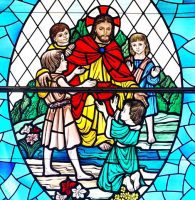GENESIS 2:15 “The Lord God took the man and put him in the garden of Eden to work it and keep it.”
Of the many topics covered in the Old Testament Wisdom Literature, economics stands out as a particular focus. The book of Proverbs, especially, has much to say about wealth, poverty, and related issues, but these themes also appear in Ecclesiastes and Psalms. Job tells the story of a man who had to deal with the loss of his wealth, and the Song of Solomon frequently refers to luxuries that were available only to the king and perhaps a few of the richest members of society.
Yet the biblical teaching on economics and the stewardship of our resources is not limited to the Wisdom Books. Many of Jesus’ parables, for instance, use illustrations drawn from commerce. Thus, if we want a better understanding of the scriptural view of wealth, poverty, and related topics, we need to look at what the entire canon has to say on these issues. Over the next few days, we will take a break from our studies based on the Wisdom Literature in order to look at some of the main points that other biblical books make regarding economics and stewardship. Dr. R.C. Sproul’s teaching series To Whom Much Is Given will serve as the basis for these studies.
Typically, we think of money whenever economic topics arise, and for good reason. After all, politicians, commentators, and others routinely tell us the costs to fund government programs, the raising of a child, and so on. However, the science of economics involves more than just dollars and cents, for economics deals with the management of all of our resources.
The English word economy comes to us as a transliteration of the Greek term oikonomia, which means “house law” or “the affairs of the house.” During biblical times, these affairs of the house often were not managed by the head of the house but rather a steward, typically a household servant who did not own the home’s resources, but who was entrusted with their care. Joseph, for example, was in charge of Potiphar’s resources even though Potiphar was their true owner (Gen. 39:1–6). Much of the biblical teaching on economics comes to us through the paradigm of the master and the steward. God owns everything in creation, even the cattle on a thousand hills (Ps. 50:10), but He has given human beings the responsibility to manage it for His glory. Ever since Adam was placed in charge of the garden (Gen. 2:15), our task has been to preserve and increase God’s resources
Whether macroeconomics or microeconomics, the science of economics from a biblical perspective is about stewardship. Ultimately, everything that we own belongs to God. He graciously gives it to us for us to manage. Thus, we are responsible to use His resources to provide for our families, and we are to protect and increase what the Lord has given to us (Lev. 19:23–25; Prov. 13:22; 1 Cor. 9:7). God will hold us accountable for what we do with His creation.
FOR FURTHER STUDY
Proverbs 20:21
Matthew 24:45–51 1
Corinthians 4:2 1
Peter 4:10–11
THE BIBLE IN A YEAR
Jeremiah 39–41
Hebrews 3:1–4:13
Source: Ligonier Ministries and R.C. Sproul. © Tabletalk magazine. Website: www.ligonier.org/tabletalk. Email: tabletalk@ligonier.org. Toll free: 1-800-435-4343.


